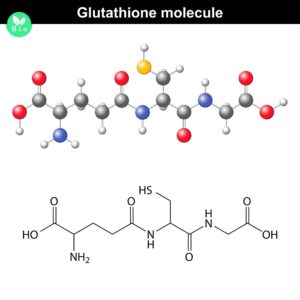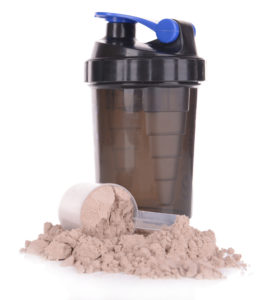How healthy is whey protein? You might be surprised.
Whey gets a bad rap sometimes. People see the plastic tubs and the powdered food and assume that whey protein is some kind of laboratory-invented chemical.
Yes, it is true that whey is processed. But it’s actually a lot more natural than you might think.
Whey protein comes from milk, which is 20% whey and 80% casein. It’s a fast-digesting, highly bioavailable protein source that also contains many beneficial nutrients such as lactoferrin.
So here they are, the top 4 whey protein benefits:
Whey Protein Benefit #1: First-Class Muscle Builder

When it comes to building muscle, there aren’t many supplements I recommend. I believe that 99% of all muscle-building supplements out there are a waste of money and potentially harmful to your health.
But if there’s one exception, it’s whey protein.
Whey protein helps build muscle for one simple reason. It’s a fantastic source of the amino acids that are the building blocks of your muscles.
It’s also very quickly absorbed, which makes it a perfect post-workout shake.
This study compared the effect of 20 g of protein (14 g from whey) against 20 g of placebo, and sure enough, the protein group had greater increases in:
- Total body mass
- Fat-free mass
- Thigh mass
- Muscle strength
- Serum IGF-1, IGF-1 mRNA, MHC I and IIa expression
- Myofibrillar protein
Finally, whey can also increase your anabolic hormones to support even more muscle-building.
Whey Protein Benefit #2: Fat Burner
Most people think of whey protein as a muscle-builder…but the truth is, it’s a powerful fat-burner as well.
How so?
This article on examine.com explains a few reasons why, which I’ll summarize here:
- Whey helps you maintain muscle so that when you lose weight, you actually lose fat (not muscle).
- Protein sources with more essential amino acids tend to be better “correlated to inducing fat loss.” Whey protein is probably the best such protein source available.
- Studies also show that high-protein diets resulted in healthier cholesterol levels than low-protein diets.
Finally, I’ll add 2 extra reasons:
- First, protein helps you feel full. You’ll be less hungry and less likely to binge.
- Second, protein has the highest thermogenic effect of any macronutrient by far. For every 100 calories of protein you eat, your body burns about 30 calories just to digest it.
Whey Protein Benefit #3: Antioxidant Promoter

High-quality whey protein can also help increase your levels of glutathione, which is often referred to as your body’s “master antioxidant.”
This study found that supplementing with whey isolate increased glutathione levels by 64%. The study concludes that whey protein can help “protect against oxidant-induced cell death in human prostate cells.” Interestingly, supplementing with casein (a different type of protein) did not increase glutathione levels.
What makes whey so effective?
In short, it contains many of the precursors your body needs to create glutathione–nutrients like cysteine, lactoferrin, immunoglobulins, and active peptides.
However, to get the most benefit you should look for whey that is undenatured (as explained here).
Whey Protein Benefit #4: Longevity Booster
According to this article, whey protein can add up to 10 years to your life!
The main mechanism for this benefit is said to be whey protein’s ability to mimic the beneficial effects of calorie restriction.
The article goes on to list other whey protein benefits—some of which are obvious (like fighting against muscle wasting), some of which are not so obvious (inhibiting cancer cell development).
- Reduces the risk of type II diabetes
- Inhibits the development of cancer cells
- Fights age-related muscle wasting
- Defends against neurocognitive decline
- Protect gastrointestinal tissue and boost beneficial bacteria
- Improves immune function
The 3 Different Types of Whey Protein

There are 3 main types of whey protein:
Concentrate
- The least processed form
- 35-80% protein
- Contains more lactose & fat
- Has more natural immune-boosters (subfractions)
- Absorbs more slowly than the other forms
Isolate
- At least 90% protein
- Fewer healthy subfractions
- Contains less lactose & fat
- (Most studies are done using isolate)
Hydrosylate
- Broken down or “pre-digested” into smaller particles
- Causes a 28-43% greater spike in insulin levels compared to isolate powders
Whey Protein Dangers & Side Effects
In all fairness, I should also let you know of the potential downsides of whey protein.
People are split on the dangers of consuming a high-protein diet. Some say it can be hard on your kidneys, and even promote kidney stones. Personally, I try to avoid mega-doses of protein and limit my diet to about 30% protein. I believe this is both a balanced and healthy diet.
Another issue is that of heavy metal contaminants. Consumer Reports found that some whey proteins were high in dangerous heavy metals, including arsenic, cadmium, and lead.
They only found these high levels in 3 out of 15 whey proteins that they tested, so you shouldn’t have to worry as long as you are using a high-quality brand. One way to find out the best sources is to check out Labdoor, which tests & ranks many protein powders based on these factors:
- Label accuracy
- Product purity
- Nutritional value
- Ingredient safety
- Projected efficacy
Or you can take my recommendations here:
Whey Protein Brand I Recommend
I’ve used and recommend all these as the highest quality whey products. (Note, these are affiliate links.)
Promix is grass-fed, undenatured, and has no artificial sweeteners. The chocolate version is flavored with raw organic cacao.
ON’s Gold Standard Whey is by far the most popular and commonly used brand. It’s not quite as natural as the other choices here (it does have some “natural flavors”), but it’s tasty and gets an A- on Labdoor.
BulkSupplements offers a no-frills protein with great reviews on Amazon. Buy the 11-pound bag to stock up and save money.
Naked Whey is a little more expensive than the others, but it’s incredibly high quality. 100% grass fed, undenatured, and cold processed.
Have Questions?
Add a comment if there’s anything else you’d like to know about whey protein!